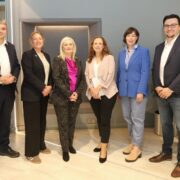Challenges such as imposter syndrome are increasingly common, yet they also represent a workforce that is ambitious and eager to grow
Nearly two-thirds of Irish employees (65%) report experiencing imposter syndrome, according to new research from Hays Ireland.
The Spring workforce survey highlights several key trends reshaping Ireland’s employment landscape, including significant job mobility intentions and generational differences in attitudes toward hybrid working and AI adoption.
“As we navigate a period of global uncertainty, the Irish workforce is at a pivotal moment, reflecting both local and international trends”
The survey, which gathered responses from over 700 participants across various industries throughout Ireland, found that 65% of employees often or sometimes experience imposter syndrome – the persistent feeling of self-doubt about one’s expertise or job suitability despite evidence of competence.
Workplace confidence
“As we navigate a period of global uncertainty, the Irish workforce is at a pivotal moment, reflecting both local and international trends,” said Maureen Lynch, managing director of Hays Ireland.
“Challenges such as imposter syndrome are increasingly common, yet they also represent a workforce that is ambitious and eager to grow.”
“To guide employees through self-doubt and unlock their full potential, organisations must foster a supportive environment”
Notably, over half of those reporting imposter syndrome are millennials and Generation X employees, suggesting that even seasoned professionals struggle with workplace confidence.
The research indicates this phenomenon spans across industries, ages, and job levels, affecting both recent graduates and experienced workers.
Rising job mobility
The research reveals substantial workforce movement, with nearly half (49%) of Irish employees planning to change organisations within the next six months – a slight increase from 45% in 2024.
Perhaps more surprisingly, 24% of employees aged 40 to 50+ plan career changes, primarily motivated by salary concerns and perceived limitations in career advancement opportunities.
In the past six months alone, 20% of employees have already switched jobs, with almost half of those job-changers in the 40 to 50+ age bracket.
This finding challenges traditional notions about mid-to-late career stability and indicates a growing willingness among experienced professionals to pursue new opportunities.
Generational divide on hybrid working
While hybrid work arrangements continue to be a significant factor in workplace dynamics, opinions on their impact vary considerably across age groups. Overall, 53% of employees report no change in their career development due to hybrid working models.
Millennials demonstrate the most positive outlook, with 30% stating that hybrid work has favorably influenced their career progression and upskilling opportunities. Only 5% of millennial employees believe hybrid arrangements have negatively affected their career trajectories.
In contrast, just 18% of employees aged 50+ report that hybrid work has had no impact on their careers. Despite these varied perspectives, productivity remains a compelling argument for flexible work arrangements, with 81% of employees reporting efficiency when working from home.
The research also indicates strong resistance to full-time office returns, with more than half (52%) of employees considering leaving their jobs if required to return to office-based work permanently. This sentiment is strongest among millennials and Generation X workers, underscoring the growing importance of workplace flexibility for talent retention.
Slow but growing AI adoption
The integration of artificial intelligence tools in the workplace shows varied adoption rates, with one-third (33%) of employees now using AI in their professional roles. However, a significant majority (67%) have yet to incorporate AI into their daily work routines.
Notably, 83% of employees report receiving no organisational training or support to help them effectively adopt AI technologies. Despite this lack of formal guidance, the research indicates strong interest in upskilling, with many employees expressing eagerness to learn how AI can enhance their professional capabilities.
Lynch emphasised the importance of supportive workplace environments in addressing these emerging trends.
“To guide employees through self-doubt and unlock their full potential, organisations must foster a supportive environment – one that prioritises open communications and offers practical resources like mentorship and coaching to help professionals thrive.”
She added: “Career mobility is an emerging trend that presents new opportunities. For employers, this is a chance to engage and retain talent by investing in meaningful career progressions and skills development. Ireland has long been a hub of adaptability and resilience, and with the right talent, both employers and employees can transform challenges into opportunities for long-term success.”
Main image: Photo by Mark Farías on Unsplash
-
Bank of Ireland is welcoming new customers every day – funding investments, working capital and expansions across multiple sectors. To learn more, click here
-
For support in challenging times, click here
-
Listen to the ThinkBusiness Podcast for business insights and inspiration. All episodes are here. You can also listen to the Podcast on:
-
Spotify
-
SoundCloud
-
Apple






